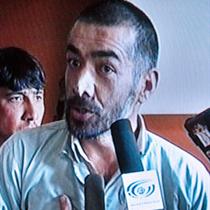Afghan Christian Convert Faces Execution

Muslim clerics say Abdul Rahman, 41, must be executed despite Western outrage. Rahman has been charged with rejecting Islam, a crime under this country's Islamic laws. His trial started last week and he confessed to becoming a Christian 16 years ago. If convicted, he could be executed. "We think he could be mad. He is not a normal person. He doesn't talk like a normal person," said prosecutor Sarinwal Zamari.
Moayuddin Baluch, a religious adviser to President Hamid Karzai, said Rahman would undergo a psychological examination. "If he is mentally unfit, definitely Islam has no claim to punish him," he said. "He must be forgiven. The case must be dropped." However, senior clerics warn that if the government caves into Western pressure and frees him they will incite people to quote -- "pull him into pieces." One cleric, who is considered a moderate, says "this man must die."
Meanwhile, a western diplomat in Kabul and a human rights advocate -- both of whom spoke on condition of anonymity because of the sensitivity of the matter -- said the government was desperately searching for a way to drop the case. Canada, the United States and other countries that have troops in Afghanistan have voiced concern about Rahman's fate.
A spokesman for Karzai, Khaleeq Ahmed, said the government would not interfere in the case but that the government "will make sure human rights are observed." The case is believed to be the first of its kind in Afghanistan and highlights a struggle between religious conservatives and reformists over what shape Islam should take four years after the ouster of the fundamentalist Taliban regime.
Afghanistan's constitution is based on the Shariah, which is interpreted by some Muslims to require that any Muslim who rejects Islam be sentenced to death. The state-sponsored Afghanistan Independent Human Rights Commission has called for Rahman to be punished, arguing he clearly violated Islamic law. It was not immediately clear when Rahman would be examined or when the trial would resume.
Television footage of Rahman at last week's hearing shows him leafing through a Bible before saying, "They want to sentence me to death and I accept it, but I am not a deserter and not an infidel. I am a Christian, which means I believe in the Trinity."
With close-cropped hair and a beard, and dressed in a baggy shirt and pants, Rahman spoke in a level voice and waved his hands in an imploring gesture. Rahman's neighbours in Kabul showed little sympathy for him.
"For 30 years, we have fought religious wars in this country and there is no way we are going to allow an Afghan to insult us by becoming Christian," said Mohammed Jan, 38, who lives opposite Rahman's father, Abdul Manan. "This has brought so much shame."
Rahman is believed to have converted to Christianity while working as a medical aid worker for an international Christian group helping Afghan refugees in Pakistan. He then moved to Germany for nine years before returning to Kabul in 2002, after the ouster of the Taliban regime.
Police arrested him last month after discovering him in possession of a Bible during questioning over a dispute over custody of his two daughters.
- article posted in National Post


